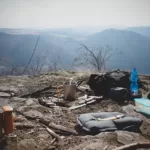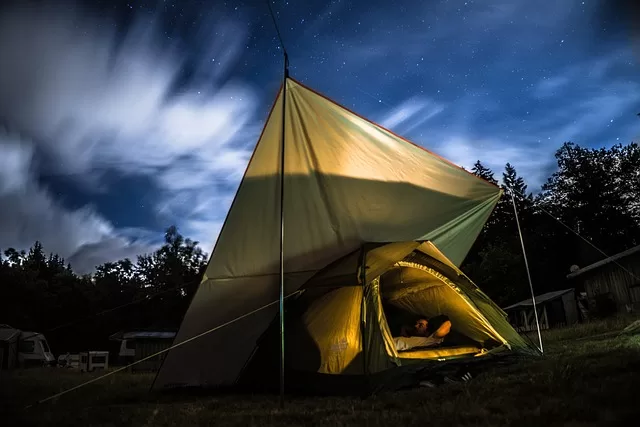Yeah, we already know that camping provides the chance to explore the stunning scenery, breath of fresh air, and create unforgettable memories by engaging in exhilarating adventures. However, as much as this is an experience we all love, it’s important to remember to take care of the environment while camping by properly managing waste and sanitation while camping.
You are not only going to be managing waste and sanitation while camping for yourself but protecting the environment and leaving it in better condition than you even met for other campers after you. Waste and sanitation management is also crucial for your health and safety as well as that of other campers, and the environment. Here is the ultimate guide and essential tips for managing waste and sanitation while camping in the best way possible.
Before You Leave Home
When it comes to managing waste and sanitation while camping, you need to properly plan and prepare even before you leave your home for the tip. Certain steps must be taken to properly manage waste while camping. Here are some useful pre-trip planning and preparation tips for waste management while camping.
Plan Ahead and Pack Accordingly
One of the most important things you can do to manage waste and sanitation while camping is to plan ahead and pack accordingly. Make a checklist of the essential camping gear and items for sanitation that you’ll need, such as garbage bags, recycling bags, compost bags, toilet paper, and hand sanitizer. It’s also a good idea to bring eco-friendly products, such as biodegradable soap and reusable water bottles.
Research Campground Rules and Regulations
Different campgrounds have different rules and regulations when it comes to waste and sanitation management. It’s important to research the rules and regulations of your chosen campground before leaving home to ensure that you are properly prepared. For example, some campgrounds may require you to pack out all of your garbage, while others may have designated waste disposal areas.
Read also Don’t Throw it Away! Creative Camping Gear Repair and Maintenance Hacks
Consider Waste Disposal Options
Before leaving home, consider waste disposal options. This includes bringing along a portable toilet or researching the location of nearby toilet facilities. Additionally, research the waste disposal options available at the campground, such as garbage bins and recycling stations. By planning ahead and considering your waste disposal options, you’ll be able to manage waste and sanitation more effectively while camping.
Purchase Eco-Friendly Products
Investing in eco-friendly products like biodegradable camping toiletries and other eco-friendly camping gear and equipment before your camping trip can help reduce waste and minimize your environmental impact. Consider purchasing reusable camping water bottles, camping coolers and storage. Stove and cooking gear, as well as sturdy camping tents and shelter. Where you can, you should opt for biodegradable or compostable products, such as paper plates and cups.
Waste Management
Waste management while camping is essential to ensure the protection of the environment and the health and safety of fellow campers. Here are some detailed notes on the various waste management practices you should consider while camping:
Garbage Disposal
As a camper, you should look to reduce your environmental impact and promote a healthier and safer camping experience for all by properly disposing of your garbage. Some of the best practices for managing waste and sanitation on your camping trip through proper garbage disposal include:
Proper Use of Garbage Bins
Most campgrounds provide designated garbage bins for campers to dispose of their waste. It’s important to use these bins properly by separating recyclable materials from regular garbage and placing them in the appropriate bins. Ensure that all garbage is bagged tightly to prevent spills and leakage.
Keeping Garbage Secure from Wildlife
Wildlife, such as bears and raccoons, are often attracted to the smell of food and garbage. It’s important to keep garbage bins tightly closed and stored in a secure location to prevent wildlife from accessing them. Campers should also clean up any food scraps or garbage around their campsite to avoid attracting wildlife.
Read also How to Plan a Successful and Enjoyable Camping Trip
Recycling
Recycling is one of the best practices for managing waste and sanitation on your camping trip. There are many benefits of recycling and ways to go about it including what items can be recycled and what can’t.
Commonly Recyclable Materials
Commonly recyclable materials include paper, cardboard, aluminum cans, glass bottles, and plastic containers. It’s important to check with the campground or local recycling facility to determine what materials they accept for recycling.
Recycling Best Practices
To effectively recycle while camping, it’s important to keep recyclable materials separate from regular garbage and place them in the appropriate recycling bins. Campers should also clean and rinse containers before placing them in recycling bins to prevent contamination.
Composting
Another way to properly manage waste and sanitation while camping is through composting. Composting is beneficial and should be done properly.
Benefits of Composting
Composting is a great way to reduce waste while camping and create nutrient-rich soil for future use. It also reduces greenhouse gas emissions by diverting organic waste from landfills.
How to Compost Properly
To compost properly while camping, start by finding a designated composting area or create your own compost bin using a sturdy container. Layer organic waste, such as food scraps and yard waste, with soil or other composting materials to help break down the waste.
Also read The Ultimate Guide to Choosing the Best Camping Bicycle and Bicycle Camping Gear
What Can be Composted
Common items that can be composted include fruit and vegetable scraps, coffee grounds, tea bags, eggshells, and yard waste such as leaves and grass clippings.
Sanitation
Sanitation is an important aspect of camping to ensure the health and safety of campers and to protect the environment. Here are some sanitation practices to consider while camping:
Personal Hygiene
Personal hygiene is an important aspect of sanitation on your camping trip. When practicing personal hygiene, proper disposal of greywater and use of biodegradable soaps are some of the practices you should consider.
Use of Biodegradable Soaps
When camping, it’s important to use biodegradable soaps that won’t harm the environment. Campers should also avoid using soap directly in natural water sources.
Proper Disposal of Greywater
Greywater is wastewater generated from washing dishes, personal hygiene, and other activities. It’s important to dispose of grey water properly by using a designated sink or draining it into a designated area away from natural water sources.
Hand Washing
Hand washing is essential to prevent the spread of germs and diseases. Campers should wash their hands frequently, especially before handling food, after using the restroom, and after any activity that may cause contamination.
Toilet Facilities
Another way for managing waste and sanitation on your camping trip involves the proper use of toilets, keeping the toilets clean and properly managing your toilet paper.
Types of Toilet Facilities
Common toilet facilities while camping includes pit toilets, composting toilets, and flush toilets. Campers should follow the guidelines and instructions provided for each facility.
Proper Use of Toilets
Always use toilets properly to prevent damage and ensure hygiene. This includes using appropriate amounts of toilet paper, avoiding flushing non-biodegradable items, and keeping the toilet seat and surroundings clean.
Disposing of Waste in a Sanitary Manner
Make sure to dispose of waste in designated waste bins or composting toilets. It’s important to avoid disposing of waste in natural water sources or burying it in the ground.
Importance of Toilet Paper Management
Toilet paper should be disposed of in designated waste bins or composting toilets. It’s important to avoid leaving toilet paper on the ground or in natural water sources as it can harm the environment.
Water Sources
One of the ways to manage waste and sanitation during your camping trip is by taking care of the water sources and the water you use while camping through proper use of water sources, water purification and filtration, and following water guidelines.
Water Filtration and Purification Methods
When camping, you should purify or filter water from natural sources to prevent waterborne illnesses. Common methods include boiling, chemical treatments, and using water filtration systems.
Proper Use of Water Sources
Use water sources responsibly by avoiding contamination, such as washing dishes or clothes in natural water sources. It’s important to follow the guidelines provided by the campground and to use designated water sources for different activities.
Importance of Water Conservation
Conserving water is essential while camping to ensure a sustainable and responsible camping experience. Campers should avoid wasting water by taking short showers, turning off faucets when not in use, and using water-efficient appliances.
Leave No Trace Principles
Leave No Trace is a set of principles and practices that are designed to minimize the impact of human activities on the natural environment. The Leave No Trace Center for Outdoor Ethics is an organization that promotes the principles of Leave No Trace and provides education and training to help people learn how to practice them.
The seven Leave No Trace Principles
There are seven Leave No Trace Principles set to protect the environment and ensure sanitation and sustainability of the environment. These principles are based on the idea that people should be aware of the impact they have on the environment and take steps to minimize that impact. By following these principles, people can enjoy the outdoors without harming the environment or other people’s enjoyment of it. The seven principles are:
- Plan ahead and prepare
- Travel and camp on durable surfaces
- Dispose of waste properly
- Leave what you find
- Minimize campfire impact
- Respect wildlife
- Be considerate of other visitors
Applying the Leave No Trace Principles to Waste and Sanitation Management
Making your camping trip environmental-friendly is important for environmental sustainability. Here are some of the ways to apply this principle to managing waste and sanitation on your camping trip:
- One of the most important Leave No Trace principles is to dispose of waste properly. This means packing out all trash and waste, including food scraps, toilet paper, and hygiene products. It’s important to dispose of waste in a way that won’t harm the environment or wildlife. For example, burying waste can contaminate water sources and harm wildlife, so it’s important to pack out all waste.
- When it comes to sanitation, it’s important to follow Leave No Trace principles as well. When camping in the backcountry, it’s important to use established campsites and latrines, if available. If there are no established campsites or latrines, it’s important to dig a cathole at least 200 feet from water sources, trails, and campsites. The cathole should be 6-8 inches deep and covered when finished.
- It’s also important to pack out all hygiene products, including toilet paper, wet wipes, and tampons. These products can take a long time to decompose and can harm wildlife if left behind.
Benefits of Leave No Trace Principles
There are many benefits to following Leave No Trace principles. Some of the most obvious benefits include:
- It helps to protect the natural environment. By minimizing our impact on the environment, we can help to preserve it for future generations.
- Following Leave No Trace principles can also help to improve our overall outdoor experience. By minimizing our impact, we can help to maintain the natural beauty of the outdoors and ensure that it remains a peaceful and enjoyable place for all visitors.
- In addition, following Leave No Trace principles can help to reduce the spread of invasive species and diseases. By minimizing our impact on the environment, we can help to prevent the spread of invasive species and diseases that can harm native plants and animals.
Conclusion
In conclusion, managing waste and sanitation on your camping trip is an essential part of responsible outdoor recreation. By following Leave No Trace principles and taking the necessary steps to minimize your impact on the environment, you can help to preserve the natural beauty of the outdoors and ensure that it remains a special place for generations to come. Following Leave No Trace principles is an important part of being a responsible outdoor enthusiast. By being mindful of our impact on the environment and taking steps to minimize it, we can help to preserve the natural beauty of the outdoors and ensure that it remains a special place for generations to come.
To manage waste and sanitation on your camping trip, it’s important to plan ahead and prepare by packing out all trash and waste, including food scraps, toilet paper, and hygiene products. When it comes to sanitation, it’s important to use established campsites and latrines and to dig a cathole at least 200 feet from water sources, trails, and campsites if there are none available.
By following these essential tips and advice, you can enjoy the outdoors without harming the environment or other people’s enjoyment of it. Remember, Leave No Trace principles are not only important for the environment but also for your overall outdoor experience. So, take responsibility and leave the wilderness as you found it, or even better. Happy camping!



























